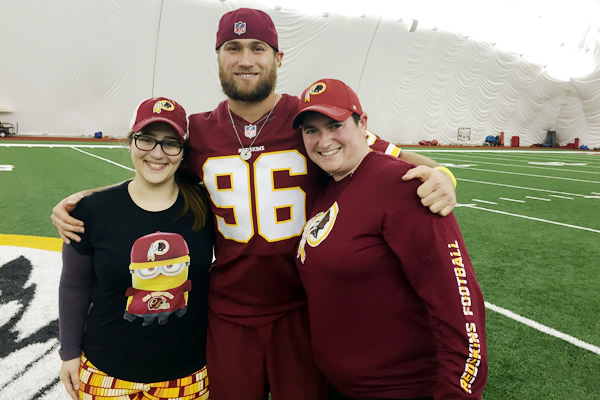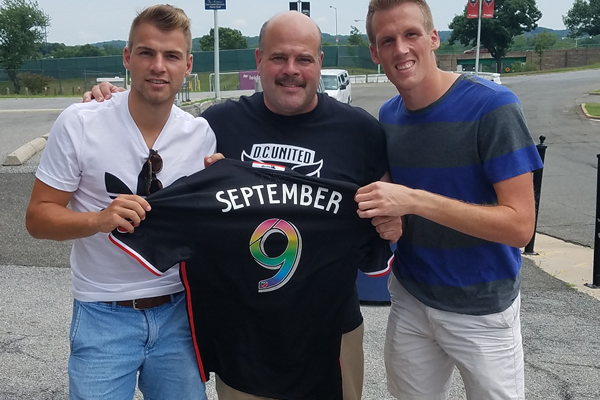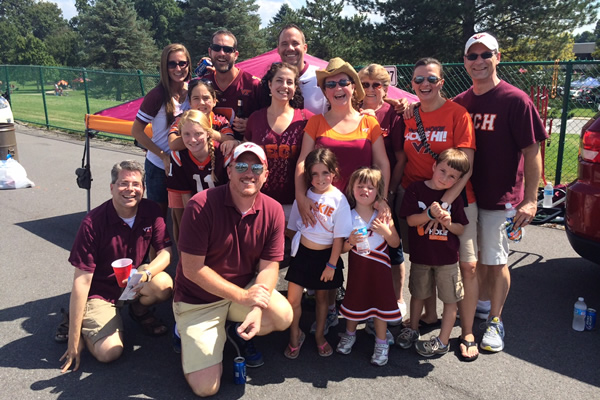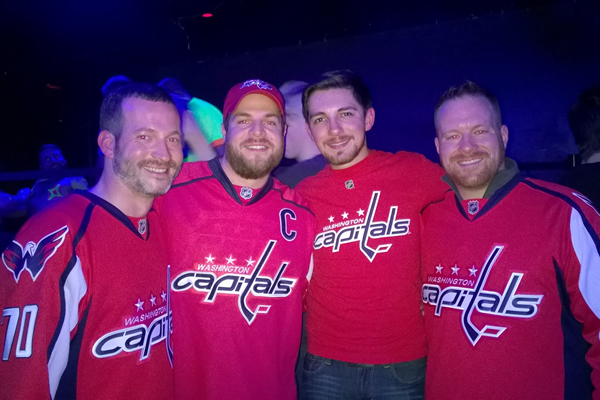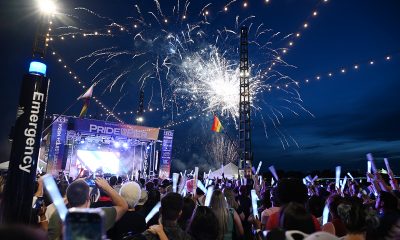Sports
Meet D.C.’s biggest gay sports fans
Local LGBT folks take joy eschewing stereotypes, following favorite teams
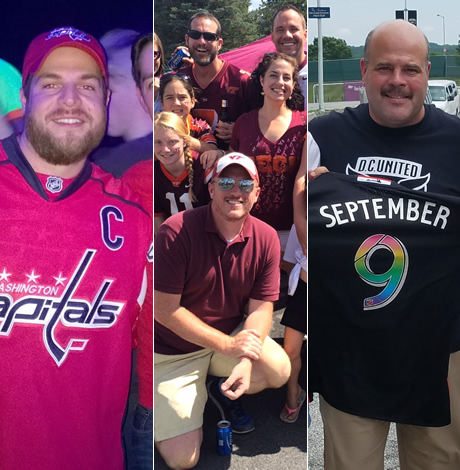
D.C. is known for its rabid fans whether they’re hoping for a Washington Redskins win, attending a Caps match or watching players round the bases at a Nationals game. Meet four of D.C. sports’ biggest gay supporters who bleed their team colors with pride.
Sami Holtz
Team: Washington Redskins.
Sami Holtz, an elementary physical education teacher hailing from Silver Spring, Md., has been a huge Redskins fan for years. Her wife, Abby, is more of a newcomer. She found herself engulfed in a world of burgundy and gold once the couple started dating.
“I didn’t marry you as much as I married the Redskins,” Abby jokes after listening to Sami excitedly recount tales of games.
And Sami has plenty.
One of her favorite memories is when she and her best friend went to a game right after free safety Sean Taylor’s murder in 2007. Sami says her ticket happened to have Taylor’s picture as the featured player. It’s a memento she still has to this day.
She recalls the multiple times she and her best friend, who is straight, attended Redskins games when the team was on a continuous losing streak. The pair still went to support and found themselves upgraded to club-level seats for half the games because the stadium was empty. But it only made the experience more fun for them both.
“Diehard Redskins fans are diehard Redskins fans. Whether they suck or they’re awesome, we don’t care. We go anyway,” Sami says.
Sami, Abby and Sami’s best friend are all members of Women of Washington Redskins, an organization for female fans. Through the organization, the trio have gone to the practice facility to run with the players. They were also given the opportunity to visit training camp for the day.
Sami and Abby aren’t limited to the Redskins. They enjoy attending games for D.C.’s women’s soccer team Washington Spirit as well. Sami says she loves watching U.S. women’s soccer games because she loves the sport but also because a couple players are LGBT. The couple also has been known to attend D.C. United games. For Sami, every D.C. game crackles with energy.
“I’ve been to D.C. United games and they make the whole stadium shake. D.C. area teams have such a rich history of fandom,” Sami says.
Jim Ensor
Team: D.C. United
Jim Ensor’s allegiance to D.C. United shouldn’t come as a surprise as he’s been playing soccer since he was a child and played on his college team.
Playing a sport as a gay man was a difficult feat for Ensor in those early years. He first told his family, which he describes as “a big, loving family but they were Catholic.” His family took it well and armed with hope from their acceptance, Ensor told his college coach.
“I was having difficulty and he kept saying, ‘What is it? What are you struggling with?’ So when I told him, he was OK with it and supportive. It explained some of the difficulties I was having focusing. It made me better. I could focus more on the task at hand instead of worrying,” Ensor says.
Ensor lives in Arlington, Va., with his fiancé, whom Ensor says isn’t as into sports. His family is also planning on attending the wedding.
And his love for soccer continued.
He became a D.C. United fan after attending one game with friends, a playoff match when they first won the MLS Cup in 1996.
Ensor’s made peace with his sexuality-related struggles in sports and hopes other athletes can find the same courage.
“Athletes put too much pressure on themselves and spend too much time assuming the world will reject them. But you want to be part of the team, you want to participate and compete,” Ensor says.
Randy Meck
Team: Virginia Tech Hokies.
Randy Meck considers himself a lover of multiple sports teams including the San Antonio Spurs, Dallas Cowboys, Cincinnati Reds and the Nationals. But no team won his heart quite like the Virginia Tech Hokies.
Meck, who lives and works in McLean, Va., at the corporate headquarters for Hilton Worldwide, became a Hokies fan while a student at Virginia Tech. Years later, he is now a season ticket holder.
He attends most home games and even tries to catch a couple road games when he can. It’s also a sure thing to spot Meck at a Caps or Nationals game at some point during the season. When he’s not physically at a game, he’s transporting himself there via TV screen.
Being such a big sports fan made coming out to his family and friends a bit confusing for them.
“Most of them were like, ‘Wait a minute — you’re a big sports fan, you can’t be gay,’” Meck says. “I think for them it helped break down some of the gay stereotypes. There’s plenty of straight men who are not into sports. It doesn’t matter whether you’re gay or straight, it’s just what you’re into. I have plenty of gay friends in the D.C. area who go to games.”
Meck believes that the future of the gay community and sports will be a positive one as more athletes become brave enough to come out.
“Thirty, 40 years ago there were very few black athletes in pro sports and we know that has changed,” Meck says. “As athletes come out of the closet earlier and earlier … I can’t fathom coming out of the closet in high school. These days kids are coming out in fifth, sixth, seventh grades. By the time they get to high school, if they’re an athletic kid, they are now a gay athlete. And if they continue those guys are going to be the pros.”
He expects more current pro athletes to start coming out because of the changing society. He cites Michael Sam as an example and says his unsuccessful NFL run was due to skill level, not coming out.
“There were questions whether or not he would be a good pro player even before he came out of the closet,” Meck says. “If he was one of those guys who was highly ranked coming out of college and going into the pros, he would still be playing in the NFL and I don’t think it’d be a problem at all.”
Mario Villafranca
Team: Washington Capitals.
Mario Villafranca grew up watching college football games thanks to his father and brothers. He attended the University of Texas and became a huge supporter of its football team. He also would attend Texas Stars games, a minor league hockey team located in Austin.
After moving to D.C., Villafranca dipped his toe into the NHL hockey waters when he attended his first Caps game. He’s been a fan ever since.
Villafranca is proud that the NHL is a supporter of the LGBT community and has a gay ally for every team. Goaltender Braden Holtby is the Caps’ appointed gay ally.
“Seeing Holtby at the gay Pride parade as a straight athlete, sends a great message to the D.C. community and across the country,” Villafranca says. “But there’s still some locker room stereotypes that don’t upset the players as it much as it bothers some of the mainstream male typical fans of sports.”
His husband Michael isn’t as big a sports fan but now and then he will root along for Texas football.
As for if the gay community is active enough in the D.C. sports scene, Villafranca says don’t let appearances fool you. He sees plenty of gay diversity at games from bears to twinks.
“I’m part of the bear community. I know men who are joyously flamboyant and they love playing on the D.C. sports teams and follow right along beside me,” Villafranca says.
Sports
Trans cyclist’s victory sparks outrage in conservative media
Katheryn Phillips is originally from DC
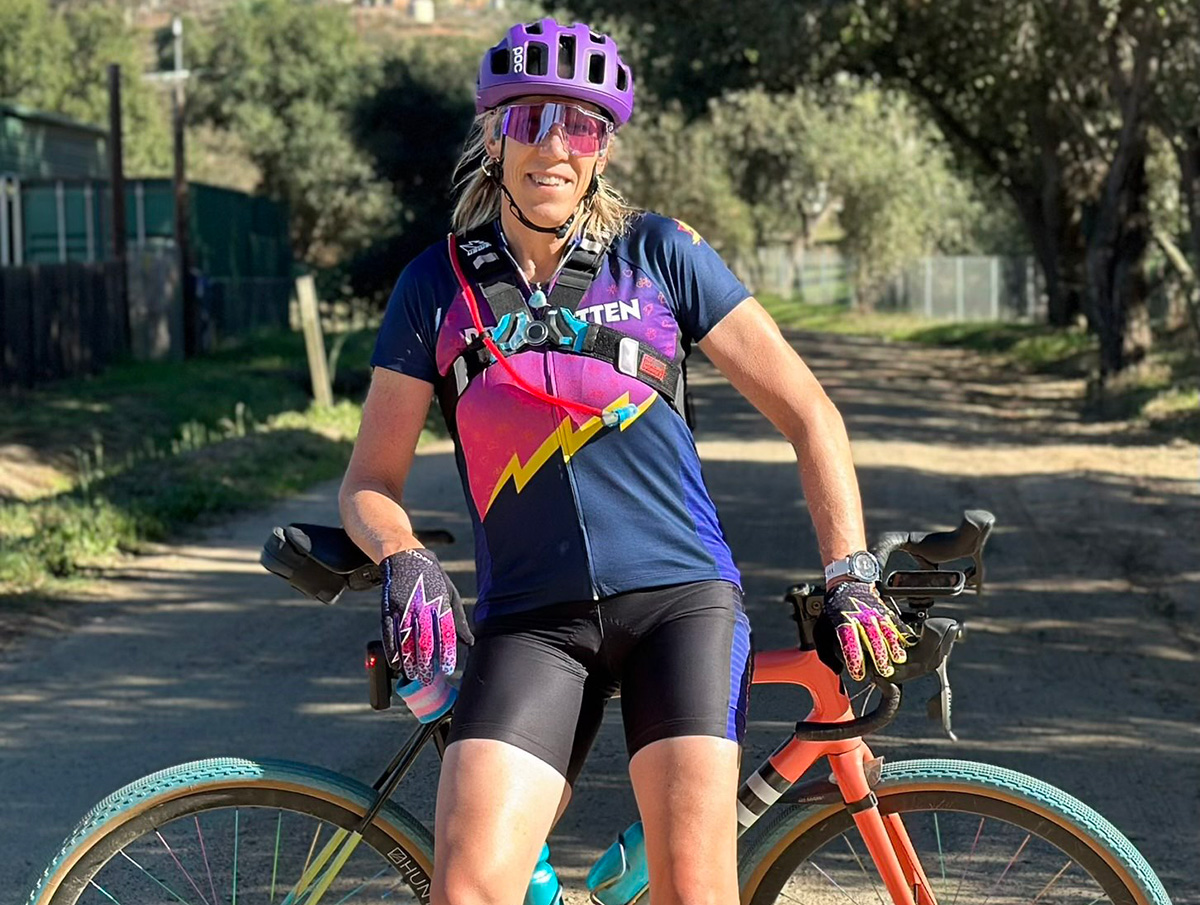
On the heels of UPenn erasing the record of the first openly transgender NCAA Division I All-American swimmer and the U.S. Supreme Court’s decision to tackle bans on trans student-athletes, right wing media is now all hot and bothered about the latest trans woman who won a cycling championship — even though she competed according to the rules.
On Tuesday, 58-year-old Katheryn Phillips finished first in USA Cycling’s Lyons Masters National Championship race for women aged 55-59, with a time of 1:42:10, according to the official results posted by the organization. The record shows her gender as “F” for female.
One second behind Phillips was Julie Peterson, with a time of 1:42:11 — as were three other cyclists: Mary Beth Grier, Andrea Cherniak-Tyson, and Carolyn Maddox.
Peterson, 57, was so outraged, she told Fox News she refused to stand on the podium in second place next to Phillips. Her story was swiftly shared by the New York Post (also owned by Fox’s parent company News Corp.), the Daily Mail, Breitbart, and other conservative media.
Both Peterson and another competitor are accusing USA Cycling of “hiding” that a transgender woman had registered to race.
“It was hidden from us. Katheryn Phillips, KJ’s name, was not on that list. And I checked it up all the way to the point of closure when we couldn’t register online anymore,” Debbie Milne told Fox.
“If I had known, I wouldn’t have spent thousands of dollars in travel and time off work to come and do a race,” Peterson said. Fox welcomed Milne, 56, who finished seventh on Tuesday, to Fox & Friends Thursday morning.
(Video courtesy of Fox News)
Peterson told Fox she did complain to USA Cycling officials prior to the race. Both Milne and Peterson referred to Phillips as a male, and with “he/him” pronouns.
“To be fair to all humans, if we want to say ‘him’ or ‘her,’ he was born a biological male, that is a fact,” Milne said. “And that is the thing that makes it an unfair advantage. Whatever has happened after that is a whole different topic.”
“I said, ‘I don’t want to race against a man,’ and they quickly scolded me and said ‘Oh, you can’t call him a man,’ and I’m like ‘Well, he is a man,’ so I was quickly scolded and corrected that it is a woman and I don’t even know what to say.”
USA Cycling did not respond to the Washington Blade’s emails requesting comment.
Phillips, who goes by Kate and by “KJ,” is a former rugby player with the D.C. Furies, who stated in the comments of a 2024 article published by Zwift Insider that she was the first out trans athlete in the U.S. to compete under the 2004 International Olympic Committee’s guidelines on trans participation.
“When USA Rugby told me about the IOC decision in 2004, I raised my hand to be included. I experience nothing but joy when I play, ride, and race,” Phillips said.
As the Blade has reported, the International Olympic Committee drastically revised those rules in 2021, and in March, Republican lawmakers in D.C. demanded the IOC ban trans female athletes from women’s sporting events altogether.
The Blade also reached out to Phillips for comment but as of press time we have not received a response. She told Zwift Insider in March 2024 she does not let those who disapprove or spread hate impact her performance or her attitude.
“I am unaffected by dissent. I love, I share joy, I am me, and I have been my authentic self for decades,” she said. It’s been reported Phillips came out in 1999, and told Zwift Insider she considers herself a lifelong cyclist.
“I’ve been on a bike for as long as I can remember,” said Phillips. “As kids, my friends and I rode all over town, we were feral kids; no cell phones, no trackers … we just roamed, and nobody got in trouble or hurt bad enough not to ride home … Scrapes/bruises/cuts were not an issue for us. In my teens, I worked for myself as a court/legal messenger, doing all of the work via my bike until I got a car. Raced BMX as a kiddo (when I mowed lawns to cover the race entry fees), I did MTB stuff (non-racing) and Sprint/Olympic Triathlons in my 30’s, and now I’m racing on Zwift, Road/Gravel, and CX in my 50s.”
In the comments section, Phillips made clear she’s not competing to win.
“I don’t do sports for victory, I do it because like many other women, I am an athlete to my core,” she said. “Unlike some, I am not there to WIN, I am there to do my best with the competitors and teammates I have around me trying to do the same…we are in it for the experience. I rejoice in their wins, and a lot of joy is reflected back to me when I have a good day.”
India
Anaya Bangar challenges ban on trans women in female cricket teams
Former Indian cricketer Sanjay Bangar’s daughter has received support

Anaya Bangar, the daughter of former Indian cricketer Sanjay Bangar, has partnered with the Manchester Metropolitan University Institute of Sport in the U.K. to assess her physiological profile following her gender-affirming surgery and undergoing hormone replacement therapy.
From January to March 2025, the 23-year-old underwent an eight-week research project that measured her glucose levels, oxygen uptake, muscle mass, strength, and endurance after extensive training.
The results, shared via Instagram, revealed her metrics align with those of cisgender female athletes, positioning her as eligible for women’s cricket under current scientific standards. Bangar’s findings challenge the International Cricket Council’s 2023 ban on transgender athletes in women’s cricket, prompting her to call for a science-based dialogue with the Board of Control for Cricket in India and the ICC to reform policies for trans inclusion.
“I am talking with scientific evidence in my hand,” Bangar said in an interview posted to her Instagram page. “So, I hope, this makes an impact and I will be hoping to BCCI and ICC talking with me and discussing this further.”
On Nov. 21, 2023, the ICC enacted a controversial policy barring trans women from international women’s cricket. Finalized after a board meeting in Ahmedabad, India, the regulation prohibits any trans player who has experienced male puberty from competing, irrespective of gender-affirming surgery or hormone therapy. Developed through a 9-month consultation led by the ICC’s Medical Advisory Committee, the rule aims to safeguard the “integrity, safety, and fairness” of women’s cricket but has drawn criticism for excluding athletes like Canada’s Danielle McGahey, the first trans woman to play internationally. The policy, which allows domestic boards to set their own rules, is slated for review by November 2025.
Bangar shared a document on social media verifying her participation in a physiological study at the Manchester Metropolitan University Institute of Sport, conducted from Jan. 20 to March 3, 2025, focused on cricket performance. The report confirmed that her vital metrics — including hemoglobin, blood glucose, peak power, and mean power — aligned with those of cisgender female athletes. Initially, her fasting blood glucose measured 6.1 mmol/L, slightly above the typical non-diabetic range of 4.0–5.9 mmol/L, but subsequent tests showed it normalized, reinforcing the study’s findings that her physical profile meets female athletic standards.
“I am submitting this to the BCCI and ICC, with full transparency and hope,” said Bangar. “My only intention is to start a conversation based on facts not fear. To build space, not divide it.”
In a letter to the BCCI and the ICC, Bangar emphasized her test results from the Manchester Metropolitan University study. She explained that the research aimed to assess how hormone therapy had influenced her strength, stamina, hemoglobin, glucose levels, and overall performance, benchmarked directly against cisgender female athletic standards.
Bangar’s letter to the BCCI and the ICC clarified the Manchester study was not intended as a political statement but as a catalyst for a science-driven dialogue on fairness and inclusion in cricket. She emphasized the importance of prioritizing empirical data over assumptions to shape equitable policies for trans athletes in the sport.
Bangar urged the BCCI, the world’s most influential cricket authority, to initiate a formal dialogue on trans women’s inclusion in women’s cricket, rooted in medical science, performance metrics, and ethical fairness. She called for the exploration of eligibility pathways based on sport-specific criteria, such as hemoglobin thresholds, testosterone suppression timelines, and standardized performance testing. Additionally, she advocated for collaboration with experts, athletes, and legal advisors to develop policies that balance inclusivity with competitive integrity.
“I am releasing my report and story publicly not for sympathy, but for truth. Because inclusion does not mean ignoring fairness, it means measuring it, transparently and responsibly,” said Bangar in a letter to the BCCI. “I would deeply appreciate the opportunity to meet with you or a representative of the BCCI or ICC to present my findings, discuss possible policy pathways, and work towards a future where every athlete is evaluated based on real data, not outdated perceptions.”
Before her transition, Bangar competed for Islam Gymkhana in Mumbai and Hinckley Cricket Club in the U.K., showcasing her talent in domestic cricket circuits. Her father, Sanjay Bangar, was a dependable all-rounder for the Indian national cricket team from 2001 to 2004, playing 12 test matches and 15 One Day Internationals. He later served as a batting coach for the Indian team from 2014 to 2019, contributing to its strategic development.
Cricket in India is a cultural phenomenon, commanding a fanbase of more than 1 billion, with more than 80 percent of global cricket viewership originating from the country.
The International Cricket Council, the sport’s governing body, oversees 12 full member nations and more than 90 associate members, with the U.S. recently gaining associate member status in 2019 and co-hosting the 2024 ICC Men’s T20 World Cup. The BCCI generated approximately $2.25 billion in revenue in the 2023–24 financial year, primarily from the Indian Premier League, bilateral series, and ICC revenue sharing. The ICC earns over $3 billion from media rights in India alone for the 2024–27 cycle, contributing nearly 90 percent of its global media rights revenue, with the BCCI receiving 38.5 percent of the ICC’s annual earnings, approximately $231 million per year.
Women’s cricket in India enjoys a growing fanbase, with over 300 million viewers for the Women’s Premier League in 2024, making it a significant driver of the sport’s global popularity. The International Cricket Council oversees women’s cricket in 12 full member nations and over 90 associate members, with the U.S. fielding a women’s team since gaining associate status in 2019 and competing in ICC events like the 2024 Women’s T20 World Cup qualifiers. The BCCI invests heavily in women’s cricket, allocating approximately $60 million annually to the WPL and domestic programs in 2024–25, while contributing to the ICC’s $20 million budget for women’s cricket development globally. India’s media market for women’s cricket, including WPL broadcasting rights, generated $120 million in 2024, accounting for over 50 percent of the ICC’s women’s cricket media revenue.
“As a woman, I feel when someone says that they are women, then they are, be trans or cis. A trans woman is definitely the same as a cis woman emotionally and in vitals, and specially, when someone is on hormone replacement therapy. Stopping Anaya Bangar from playing is discrimination and violation of her rights. It is really sad and painful that every trans woman need to fight and prove their identity everywhere,” said Indrani Chakraborty, an LGBTQ rights activist and a mother of a trans woman. “If ICC and BCCI is stopping her from playing for being transgender, then I will say this to be their lack of awareness and of course the social mindsets which deny acceptance.”
Chakraborty told the Blade that Bangar is an asset, no matter what. She said that the women’s cricket team will only benefit by participation, but the discriminating policies are the hindrance.
“Actually the transgender community face such discrimination in every sphere. In spite of being potent, they face rejection. This is highly inhuman. These attitudes is regressive and will never let to prosper. Are we really in 2025?,” said Chakraborty. “We, our mindset and the society are the issues. We, as a whole, need to get aware and have to come together for getting justice for Anaya. If today, we remain silent, the entire community will be oppressed. Proper knowledge of gender issues need to be understood.”
The BCCI and the International Cricket Council have not responded to the Blade’s repeated requests for comment.
Sports
English soccer bans transgender women from women’s teams
British Supreme Court last month ruled legal definition of woman limited to ‘biological women’
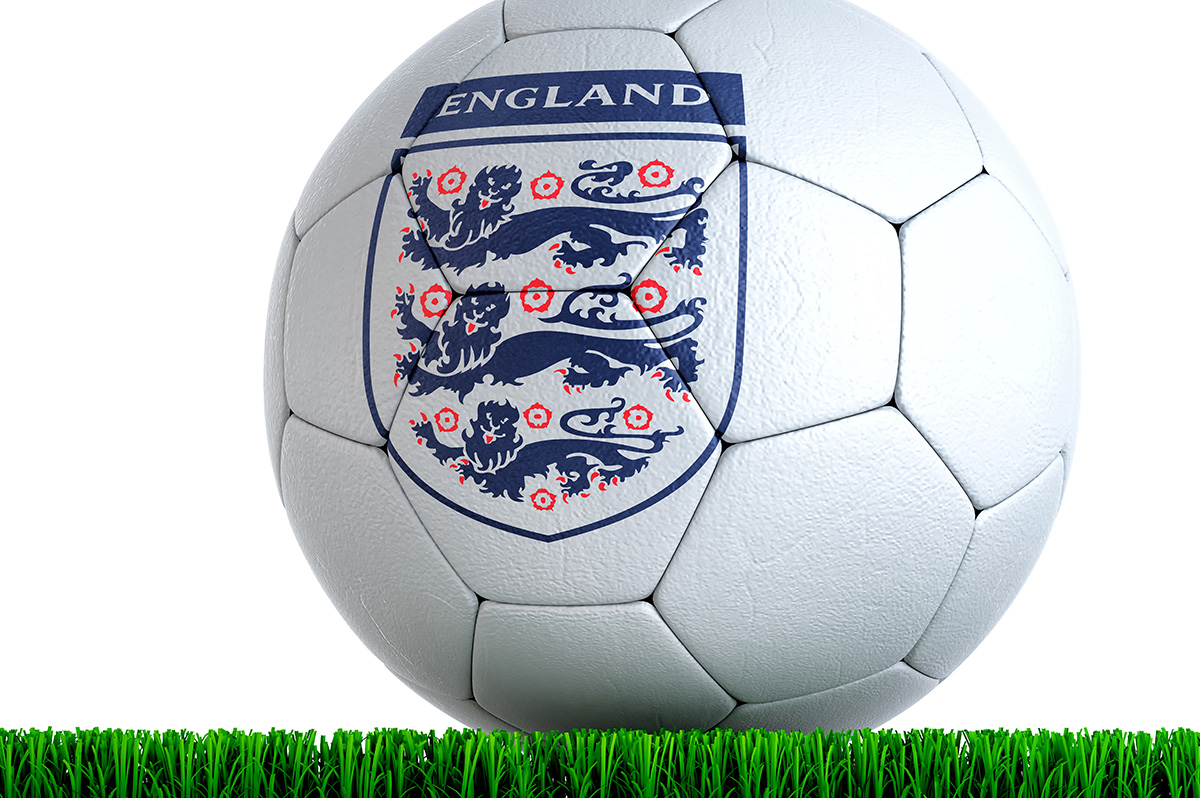
The organization that governs English soccer on Thursday announced it will no longer allow transgender women to play on women’s teams.
The British Supreme Court on April 16 ruled the legal definition of a woman is limited to “biological women” and does not include trans women. The Football Association’s announcement, which cites the ruling, notes its new policy will take effect on June 1.
“As the governing body of the national sport, our role is to make football accessible to as many people as possible, operating within the law and international football policy defined by UEFA (Union of European Football Associations) and FIFA,” said the Football Association in a statement that announced the policy change. “Our current policy, which allows transgender women to participate in the women’s game, was based on this principle and supported by expert legal advice.”
“This is a complex subject, and our position has always been that if there was a material change in law, science, or the operation of the policy in grassroots football then we would review it and change it if necessary,” added the Football Association.
The Football Association also acknowledged the new policy “will be difficult for people who simply want to play the game they love in the gender by which they identify.”
“We are contacting the registered transgender women currently playing to explain the changes and how they can continue to stay involved in the game,” it said.
The Football Association told the BBC there were “fewer than 30 transgender women registered among millions of amateur players” and there are “no registered transgender women in the professional game” in England, Scotland, Wales, and Northern Ireland.
The Scottish Football Association, which governs soccer in Scotland, is expected to also ban trans women from women’s teams.

